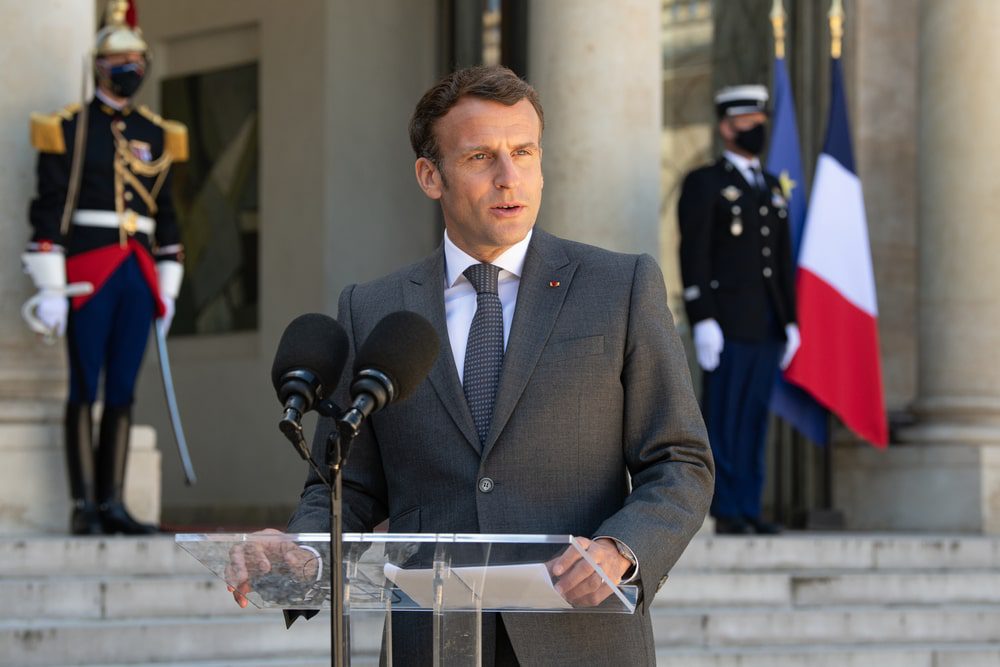No products in the cart.

Under the pretext of the war in Ukraine, Emmanuel Macron waited until the very end to announce his candidacy for his own succession to the presidential election—that is, until Friday, March 4th. Even before becoming a candidate he had collected 1,974 sponsorships and had them deposited with the Constitutional Council. The last step remained to be taken. His official announcement was made through a Letter to the French People, published in the press just before the end of the official filing of candidacies.
In this letter, the people of France will find the major themes that are dear to the current President of the Republic. The emphasis is on progress and reforms. The problems highlighted by the pandemic, the explosion of deficits or the drastic reduction of civil liberties, are more or less subtly ignored. Emmanuel Macron’s campaign will draw from the well of voluntarism and progressivism. “The challenge is to build a France for our children, not to rehash the France of our childhood,” he explains: a way of targeting Éric Zemmour’s discourse, accused of clinging too much to the past of a France that no longer exists. The reference, however, to the future for “our children” has been cringeworthy, and on several occasions has served to highlight the candidate’s own condition of being childless, undermining the paternal role he attempts to embody.
An outburst of criticism accompanied this last-minute candidacy. For several weeks, Emmanuel Macron has been accused of taking advantage of the pandemic, and then of the war, to dodge debates about his time in office, which is now coming to an end. He admits it himself and seems to accept it in his Letter to the French: “Of course, I will not be able to campaign as I would have liked because of the context,” he explains—a way to disclose his intention to avoid a polemical arena with the other candidates. There is no legal or constitutional obligation to force an incumbent president to participate in first round debates. But the signal sent to the public will throw an unfavorable light on his candidacy.
And then—coincidence or chance? The day Emmanuel Macron announced his candidacy, a substantial number of accounts belonging to the teams of Éric Zemmour and Marine Le Pen were suspended by Twitter without any explanation, triggering a wave of indignation on this social network with the hashtag #StopCensure. A few hours later, the accounts were reinstated, on the grounds that it had been an “error.”
La suspension sans sommation de comptes politiques en pleine campagne présidentielle, bien qu'ensuite rétablis, est un acte grave. Volontaire ou erroné, cette "censure" mérite une explication et le rétablissement des comptes dans leur intégrité.
— Marine Le Pen (@MLP_officiel) March 4, 2022
(#StopCensure)
« Par erreur » Twitter ne censure jamais les comptes macronistes.
— Florian Philippot (@f_philippot) March 5, 2022
« Par erreur » Twitter censure toujours les comptes d’opposants.
Vraiment pas de chance !#STOPcensure
À 36 jours du 1er tour de l’élection présidentielle et au lendemain de la déclaration de candidature de Macron, de nombreux comptes Twitter de mes soutiens viennent d’être suspendus.#STOPcensure
— Eric Zemmour (@ZemmourEric) March 4, 2022
The opposition criticised the late declaration of the president’s candidacy because it allowed Emmanuel Macron to communicate at will without having his speaking time officially counted under the rules of the presidential campaign designed to ensure fairness with other candidates. He also took advantage of his position as outgoing president to shoot his first campaign clip at the Elysée Palace—a privilege that the other candidates cannot boast of and which gives him an undeniable comparative advantage in terms of staging and symbols.
At a time when Emmanuel Macron’s candidacy is becoming clearer, Prime Minister Jean Castex has accelerated the lifting of the last sanitary restrictions linked to the COVID-19 pandemic, almost a month ahead of the schedule initially planned. The end of mandatory masking in almost all places concerned has been announced to be Monday, March 14th, as well as the “suspension” (not the suppression) of the vaccination pass. The mask will however remain compulsory in public transport and a health pass will remain necessary in medical establishments. The concomitance of these announcements with Emmanuel Macron’s official entry into the campaign has led to criticism from the political opposition. Marine Le Pen criticised the political opportunism of the government’s timing:
L'annonce par Jean Castex de la suspension du #PassVaccinal le 14 mars, moins d'un mois avant l'élection présidentielle, démontre combien imposer ce dispositif était inutile et inefficace, mais aussi politiquement cynique.
— Marine Le Pen (@MLP_officiel) March 3, 2022
#Castex13hhttps://t.co/qT1Cmanwwd
On Monday, March 7th, Emmanuel Macron held his first campaign meeting in the Yvelines department. His campaign slogan, “Avec vous” (With you), was immediately criticised and parodied by his opponents, who are now brandishing their counter-slogan: “Sans lui” (Without him).